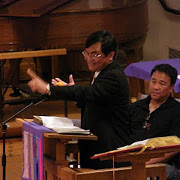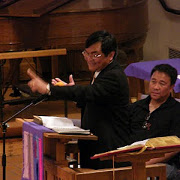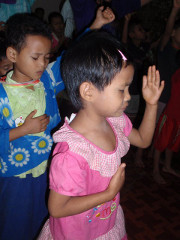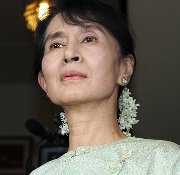 |
(Cover photo courtesy the Methodist Church of Lower Myanmar.
Story photo by Tasha Sargent) Bishop Zothan Mawia
|
Myanmar (MNN) ― Christians in Myanmar are hopeful.
For the first time in decades, real change seems to be coming. Not only that, but the reforms appear to be sticking. Aung San Suu Kyi, the country's most famous dissident-turned-parliament-member doesn't negate that, but she does urge caution.
There are a great number of tasks that face the emerging nation, and it's exactly that challenge to which
Asian Access rises. The ministry has been working behind the scenes in Myanmar, and up until recently was shaped by Bishop Zothan Mawia.
Mawai explains why care would be prudent. "We have been isolated for many years. [In] 1962, the military took over, and then all the education was from English medium to Burmese medium. We were isolated in the sense that going out of Myanmar is also quite difficult. Education was weakened."
The political infrastructure remains fragile, and peace with the Maoists is equally frail. "Slowly, it's moving. We can't change in one day's time, so we need time," explains Mawia. A leap forward isn't realistic. "In that sense, we also realize that we have a part to play. We are trying our best to have this mindset change." Unless the mindset changes internally, lasting change for Myanmar is fleeting.
From the beginning, Mawia's heart has been bent toward reconciliation. In order to move forward, he's stressed the importance of understanding others' hurts as well as the willingness to forgive.
That's where Asian Access programs are most effective. "For Christians, we believe that the transformation is by the power of the Holy Spirit. So we hope the very basic mindset will be changed. That might be better for the community and then hopefully for the country. So far, that's what we have in mind."
The groundwork was already in place, since A2 has been in Myanmar since 2003. Though Mawia is not actively directing A2's ministry there now, he was integral in getting A2 launched. He has since passed the baton to a new, younger leader.
There were three things he noted as obstacles to effective church growth in Myanmar. One came about as a result of a weakened education system. "Many potential leaders like to go abroad for further study, but their English is weak, so many of them cannot." Going abroad may have been immaterial, since few could afford the study--problem number two. And the last problem: cultural differences that created nearly as much frustration as the language barrier.
Asian Access' work of leadership training has been recognized as one of the most creative and fruitful leadership training programs in Asia. The key to its effectiveness is the careful selection of twelve emerging leaders.
First things first, says Mawia. "Pastors work very hard, focusing on ministry. But the relationship with God, many times we just ignore unconsciously. We try to make that number one, to make the leaders come back to the love of God."
These leaders are then invited to be a part of a class that meets four times a year, for a week at a time, over a two-year period. When the twelve meet together, they are working through an established curriculum that accelerates their growth as spiritual leaders, as well as organizational leaders. At their training sessions, they are resourced by leaders in and outside their country.
Mawia proudly notes the success of a program that thrived despite the oppressive conditions of the country in which they were operating. The first class graduated with 11, then 12, and then last May, nine graduates from the 3-year courses were ready for their own ministry.
As part of their training, leaders are also given the skills to determine the needs of the communities and the context in which they live and minister. Upon that knowledge, they then develop skills to equip their congregation for effective service, Mawia explains. "Though we are a minority, we still have to show forth Jesus Christ or the power of the Holy Spirit through our life, that they may be able to come to God."
New church leaders don't always have a clear path. However, for the most part, the communities where the leaders work notice something immediately. "They are also aware that we Christians are different. They can accept Christians and say, 'You are based on love.' We are not threatening them."
The question really is: is the change bringing hope, or is it hope bringing change?




